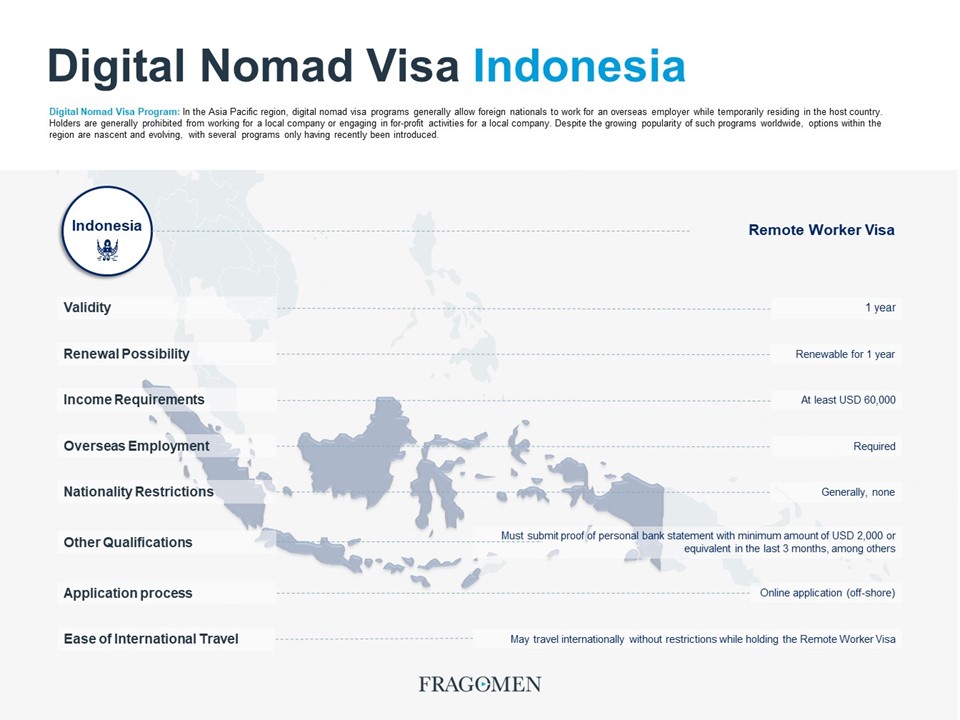The Rise of Indonesia’s Remote Worker Visa: Considerations for Digital Nomads
July 2, 2024
By: Ryaihanny Sahrom, Sofea Aiman
The nature of labor has changed exponentially following the emergence of the digital revolution. A more adaptable and dynamic work style has replaced the traditional, in-office work structure: remote working.
As the world embraces this new way of working, countries are beginning to adapt their policies to attract and accommodate the growing number of digital nomads and remote workers, including Indonesia.
Until recently, navigating the bureaucratic hurdles to live and work in Indonesia for an extended period was a daunting task, especially with the previously available visa options that mostly fall in the ‘gray area’ for unconventional workers. This archipelago nation of stunning landscapes, rich culture and warm hospitality is one of the latest to join the digital nomad visa trend by introducing its own Remote Worker Visa (E33G) program.
With the rise of digitalization and online remote working in the aftermath of the COVID-19 pandemic, there has been a fundamental shift in how corporations and businesses operate. As the demands for remote working are on the rise, Indonesia has now joined the trend by launching its Remote Worker Visa - a strategy to adapt to a progressively changing world.
Unlocking the Remote Worker Visa
Throughout the years, remote working in Indonesia has remained a gray area under the immigration laws and foreigners were encouraged to obtain a valid work and stay permit under a local sponsor if they wanted to work compliantly in Indonesia.
Recognizing the changing nature of work and the potential benefits of attracting remote workers, Indonesia has taken a progressive step forward by launching its remote worker visa program. The Remote Worker Visa (E33G) offers a streamlined application process for those looking to make Indonesia their temporary home base. This initiative aims to make it easier for digital nomads and remote employees to live and work in Indonesia.
The application process was designed to be efficient and accessible. Applicants can apply for the E33G visa online at the government visa portal. Required documents typically include proof of employment, a valid passport, a digital photograph of the applicant and evidence of sufficient funds of at least USD 2,000. They must also demonstrate that their foreign employment contract offers a minimum of USD 60,000 annual salary. Additional documents may be requested after submission.
Successful applicants for the Remote Worker visa are granted up to one year of stay, with the option to extend for an additional year. This flexibility allows remote workers to immerse themselves fully in Indonesian culture, explore its natural wonders and contribute to the local economy.
The Ideal Visa for the Digital Nomad?
The Remote Worker Visa for foreign nationals seeks to attract workers who are seeking to relocate to popular destinations like Bali, Jakarta and other major Indonesian cities, as well as more secluded parts of the country.
An advantage of the Remote Worker Visa in comparison to the Visa on Arrival is that the latter only allows for a limited stay period (30 days, renewable for another 30 days), whereas the former allows for an entire year of stay with eligibility for multiple exit and re-entry.
While the visa allows remote workers to reside in Indonesia, it does not grant permission to work for, or profit from any Indonesian entities or vendors.
In the past couple of years, the Indonesian government has introduced new and novel visa programs like the Second Home Visa and Golden Visa. Following the release of the Second Home Visa in 2023, many foreigners have conflated this with a Digital Nomad Visa.
While the Second Home Visa has prompted much interesting chatter within the Digital Nomad community, if we were to scratch the surface deeper, the proof of funds requirement under that visa category is substantial. Therefore, it is likely misleading to market it as a true ‘Digital Nomad’ Visa and is also unsuitable for many remote workers.
Looking Forward
With Indonesia’s diverse natural beauty and vibrant culture, it has long been a magnet for travelers seeking adventure and inspiration, attracting a thriving expatriate and itinerant community. By trying to attract more remote workers, Indonesia stands to benefit from increased spending on accommodation, transportation, dining and leisure activities that inject vital funds into local businesses and communities.
It is important to note that the Remote Worker Visa is a newly introduced visa category following the growing demand for international remote jobs. Considering the situation, the Indonesian Immigration Authority may still carry out systematic adjustments, revisions and various changes to the visa process steps and requirements by updating the regulations (generally without prior notice).
It is unclear whether the Indonesian authorities will implement further restrictions to prevent any abuse of the program, as the finer details of the visa are still being worked out. The Fragomen team will continue to closely monitor and provide updates as the Indonesian authorities refine the regulations along the way.
Need to Know More?
For further information on Indonesia’s immigration policies, please contact Senior Business Immigration Manager Alfred Chong at [email protected] and Business Immigration Consultants Ryaihanny Sahrom and Sofea Aiman at [email protected] and [email protected], respectively.
This blog was published on 2 July 2024, and due to the circumstances, there are frequent changes. To keep up to date with all the latest updates on global immigration, please subscribe to our alerts and follow us on LinkedIn, X, Facebook and Instagram.














